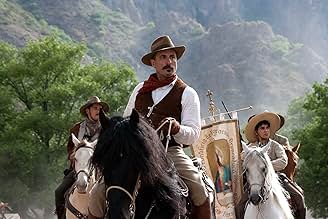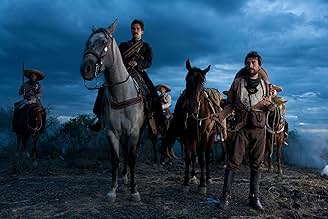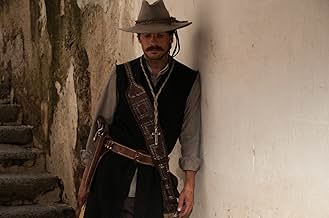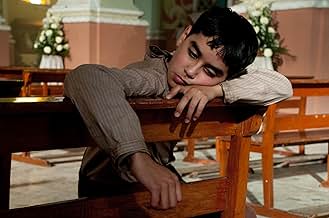Gottes General - Schlacht um die Freiheit
Mexiko 1926. Als Präsident Calles Kirchen stürmen und Priester ermorden lässt, kommt es zu einem Volksaufstand. Es bildet sich eine Widerstandsbewegung, die Cristeros, die fortan einen erbit... Alles lesenMexiko 1926. Als Präsident Calles Kirchen stürmen und Priester ermorden lässt, kommt es zu einem Volksaufstand. Es bildet sich eine Widerstandsbewegung, die Cristeros, die fortan einen erbitterten Freiheitskampf führt...Mexiko 1926. Als Präsident Calles Kirchen stürmen und Priester ermorden lässt, kommt es zu einem Volksaufstand. Es bildet sich eine Widerstandsbewegung, die Cristeros, die fortan einen erbitterten Freiheitskampf führt...
- Auszeichnungen
- 3 Gewinne & 9 Nominierungen insgesamt
- Sandra Gorostieta
- (as María Fernanda Urdapilleta)
Empfohlene Bewertungen
It's the tale of the Cristeros War (1926-1929); a war by the people of Mexico against the Mexican government who cracked down in brutal ways against the Catholic Church and against religious freedom in general. Andy Garcia is Oscar level good here as General Gorostieta, a man with limited faith who responds and masterfully leads the fight for freedom. It's intense and, at times, surprisingly violent and impactful. This movie delivers real emotion and doesn't dodge tough questions about faith. It delivers an exceptional balance of showing why people behave and choose to engage in certain behaviors even when such behavior is contrary to the core of their belief system.
One thing is certain; no one who has faith will take it or their religious freedom for granted after watching and EXPERIENCING this film. That's how it registered with me at any rate.
The cast is top-notch and the direction pretty competent, keeping the story weaved among intimate scenes and battle scenes. Filled with poignant moments of the lives of the protagonists and of those close to them and with the heroic - as well as less than heroic - skirmish scenes.
It's a movie about taking sides courageously, how conflicting this can be in a man's conscience, especially when it involves the spilling of blood. If anything, the personal struggle of many characters getting into this war and carrying it out made the film shine. From the young boy who faced martyrdom for the Catholic faith - Jose Sanchez del Rio, beatified in 2005 - to his uncle, a cowardly mayor too enamored of power to save him.
I cannot help thinking how timely this film is when the Church and Catholics - for now - are again being curtailed in their freedoms by a government with its own agenda, this time the American government trying to limit the Church's ministry and to force Catholics to violate their consciences. Like Calles, Obama has presented the same arguments to justify his unjustifiable actions against the Church, Catholics and their institutions. It's government might over faith, the collective over the individual, an usurpation of the state to serve not the people, but an ideology.
PS: disregard most professional critics' reviews for they seem to have a chip on their shoulder so big that it blinds them to the artistic and cinematographic qualities of this film.
We might live in societies today that don't have to fight for certain things, but it's not too much of a stretch to see why and how some had to fight for freedom of speech or religion or other things. The movie depicts a real life event/incidents, which might appall some viewers from the get go, but if you like Drama and History in general, this might be for you. I haven't read too much about how things went down exactly, but I reckon this movie made me aware of a chapter I hadn't had heard about before ...
It is ironic that a movie that purports to represent a popular struggle in defense of religion pointedly ignores the main protagonists: the peasants themselves, both as individuals and in their collective action. Throughout the movie, neither the peasant forces, nor the government soldiers that are sent against them are ever depicted as real human beings.
This movie's celebration of faith and charisma—reduced to the cry 'Long Live Christ the King!'—is a crude effort to obscure the underlying class conflicts that gave rise to the real Cristeros, a social movement that is not widely understood .... Victorious in the Mexican Revolution, the Constitutionalist Army, led by Venustiano Carranza, Álvaro Obregón and Calles, had defeated the peasant armies of Pancho Villa and Emiliano Zapata. The new regime was incapable of resolving a central issue over which the Revolution had been fought, the redistribution of land.
The slow and erratic pace of land distribution under Carranza, Obregón and Calles confirmed to the peasantry the military government's timidity in confronting the large and powerful landowners. The immense properties of the church constituted an important source of economic stagnation and social instability. Efforts in the 19th century to force the church to rent out its land to others, let alone to surrender ownership, met with fierce opposition.
According to historian Jesús Silva Herzog the peasantry and the working class confronted a "demonic triumvirate:" the great landowners, the military, and the Church. "Three tragic words define Mexican history: haciendas, sacristy and barracks." Lacking a revolutionary party and isolated from the workers, the rebellion of Mexican peasants was hobbled by the Catholic Church. Desperate peasant and Indians threw themselves into battle during the Cristero War ideologically imprisoned by Catholic dogma.
Had the Cristero War merely pitted the government of President Calles against the Catholic establishment, it is unlikely that the unprecedented brutality—the mass repression of peasants, the burning and looting of their towns—would have taken place. Historically, ruling classes reserve this kind of gross brutality to the rebellion of the most oppressed: peasants, workers or slaves.
Wusstest du schon
- WissenswertesPartially financed by the Knights of Columbus, whose members in both the United States and Mexico were an integral part of the actual Cristeros Rebellion.
- PatzerJose gives up his white horse to another christero during a battle and hides in the rocks. When the other christero comes back to look for Jose, he is on a brown horse.
- Zitate
Father Christopher: Who are you if you don't stand up for what you believe? There is no greater glory than to give your life for Christ.
- Crazy CreditsNear the end of the credits, "Batman" is credited as a painter.
- VerbindungenFeatured in The Secret Masonic Victory of World War Two (2022)
Top-Auswahl
- How long is For Greater Glory: The True Story of Cristiada?Powered by Alexa
Details
Box Office
- Budget
- 12.000.000 $ (geschätzt)
- Bruttoertrag in den USA und Kanada
- 5.672.846 $
- Eröffnungswochenende in den USA und in Kanada
- 1.885.608 $
- 3. Juni 2012
- Weltweiter Bruttoertrag
- 10.173.682 $
- Laufzeit
- 2 Std. 25 Min.(145 min)
- Farbe
- Sound-Mix
- Seitenverhältnis
- 2.35 : 1





































